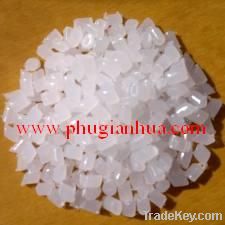


سعر فوب
أحصل على آخر سعر( Negotiable )
|1000 Kilogram Minimum Order
بلد:
Vietnam
نموذج رقم:
plastic masterbatch
سعر فوب:
( Negotiable ) أحصل على آخر سعر
الموقع:
Viet Nam
سعر الحد الأدنى للطلب:
-
الحد الأدني للطلب:
1000 Kilogram
تفاصيل التغليف:
Packaging is packaged in quantities 25kgs PP woven
موعد التسليم:
15 - 30
القدرة على التوريد:
20000 Kilogram per Month
نوع الدفع:
T/T
مجموعة المنتج :
-
الشخص الذي يمكن الاتصال به Mr. HOANG
404/2/2 Quang Trung St., W.10, Go Vap Dist, Ho Chi Minh City, Other
The extrusion of molten polymers is often limited by the occurrence of melt fracture (MF). Although there is more than one phenomenon described by this term, sharkskin is the most common melt fracture type for film grade linear low density and high-density polyethylene (LLDPE and HDPE respectively).
Fluoropolymer based polymer processing additives (PPAs) have been used for many years in LLDPE, HDPE and other polyolefin extrusion processes to eliminate melt fracture.
A.Eliminate Sharkskin
The throughput of several industrially important classes of polymers is limited by a processing defect known as melt fracture or "sharkskin," which is a surface defect on the extruded polymer.
The surface of the polymer becomes rough, resulting in a loss of gloss and a change in certain surface properties. Sharkskin occurs beyond a critical throughput and affects extrusion operations such as film blowing, film casting, extrusion blow molding, tube extrusion, and wire coating. Sharkskin could be reduced or eliminated by the incorporation of a PPA, allowing processors to increase throughput, reduce energy consumption, and enhance processing quality. Fluoropolymer processing additives migrate to the die surface during extrusion where they lower the surface energy, allowing the main polyolefin to slip at the wall.
B. Reduce Die Build-up
Die Build-Up (DBU) is the progressive deposition of components of the extrudate exiting a die during extrusion operations. It occurs with many polymers, on virtually all converting techniques such as blown film extrusion, coating, pipe and profile extrusion
DBU gives rise to surface irregularities affecting aesthetic, optical and mechanical properties of the extrudates. These effects worsen with time to the extent that extrusion has to be stopped for die cleaning, at the expense of production cost-efficiency.
Die build-up is related to die-swell, which provides a medium for transporting pigments, degraded polyolefin, and other materials towards the die surface.
The use of appropriate fluoropolymer based processing additives is an efficient way to minimize DBU. PPAs favor polymer slip. At a given throughput, this results in a reduction of the stress level, and therefore die-swell as well. Furthermore, the PPA coating reduces the surface energy of the die wall. Thus, degraded materials and pigments have fewer propensities to adhere to the metal surface. Together with die swell reduction, the low surface energy will also promote efficient DBU reduction.
Polymer Processing Additives (PPAs) have been shown to be effective in reducing die build-up (DBU) in a variety of olefin and non-olefin resins (PVC, HDPE, LLDPE, LDPE, PP, PS, Nylon...)
C. Suppress Gel
Gel formation in polyolefin film is a phenomenon that is difficult to predict, reproduce and solve. Gel formation may have one or more compounding factors like humidity, polymer stabilization package, catalyst residues, polymer molecular weight distribution, the presence of oxygen, extruder and die design, and dispersion of inorganic additives to name a few.
The use of polymer processing additives (PPAs) to eliminate melt fracture and die build-up in LLDPE is well known, and the same mechanism should make this additive effective for unmixed, cross linked and oxidized gel reduction. PPA products are effective at reducing gels formed in the extruder. However, there are other types of gels such as contamination gels (fiber and angel hair/dust contamination) formed during the polymerization process that PPAs will not reduce.
The low-energy surface provided by the fluoropolymer coating prevents the accumulation of low molecular weight species and oxidized polyethylene, and may also (in grooved feed extruders) help prevent gels caused by premature melting of lower density POP's. The reduction of gels through a processing additive coating mechanism may be enhanced by stabilizers and other additives.
| بلد: | Vietnam |
| نموذج رقم: | plastic masterbatch |
| سعر فوب: | ( Negotiable ) أحصل على آخر سعر |
| الموقع: | Viet Nam |
| سعر الحد الأدنى للطلب: | - |
| الحد الأدني للطلب: | 1000 Kilogram |
| تفاصيل التغليف: | Packaging is packaged in quantities 25kgs PP woven |
| موعد التسليم: | 15 - 30 |
| القدرة على التوريد: | 20000 Kilogram per Month |
| نوع الدفع: | T/T |
| مجموعة المنتج : | - |